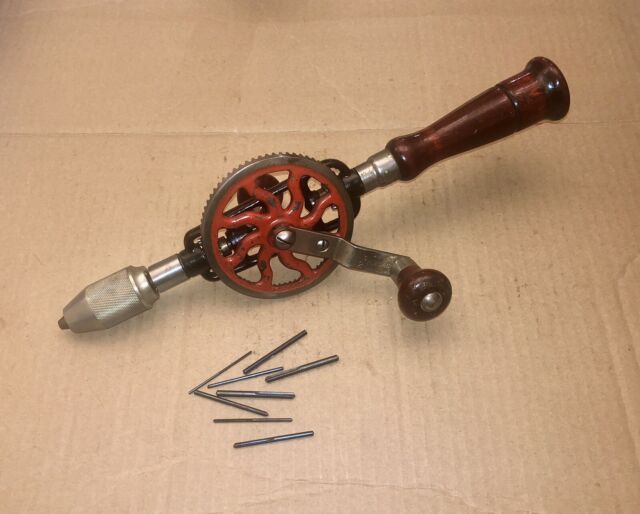Finding the Best Egg-Beater Drill: A Comprehensive Review
When it comes to precision drilling in woodworking, crafting, and DIY projects, the age-old hand drill, also called an egg-beater drill in more modern times, has proven its worth time and again. With a blend of tradition and modern engineering, these egg-beater-style drills offer manual control and finesse, making them indispensable tools for any artisan. Amazon presents a wide array of options, and we’ve curated the top 5 egg-beater drill products that combine functionality, durability, and value for money. Whether you’re a professional craftsman or a hobbyist, these hand drills are sure to enhance your drilling experience. Note, below you may see hand drill and egg-beater drill used interchangeably – they are different names to express the same thing. Happy reading!
To see our related product guide article, click here.
Top Picks for Best Egg-Beater Drill
Swpeet Powerful Speedy Egg-Beater Drill 1/4-Inch Capacity with 13Pcs Drill Bit Set
The Swpeet Powerful Speedy Hand Drill is a versatile tool designed for precision drilling in woods and plastics. Its finely cast steel double pinions design ensures smooth and accurate drilling, while the included 13-piece drill bit set covers a range of sizes for various applications. The chucks and grip handle provide a secure hold and control, minimizing user fatigue. This hand drill’s 1/4-inch capacity makes it suitable for both delicate tasks and more substantial projects.
Pros:
- Double pinions design for smooth operation.
- Comprehensive drill bit set included.
- Secure grip handle for comfortable use.
- Versatile 1/4-inch capacity.
Cons:
- Limited capacity for heavy-duty tasks.
Fiskars Crafts DIY Precision Egg-Beater Drill
The Fiskars Crafts DIY Precision Hand Drill (egg-beater drill) is an elegant and efficient option for those seeking precise control. Its streamlined design is paired with a durable build, ensuring longevity. While it’s ideal for lighter materials like plastics and softwoods, it might struggle with denser materials. The grey and white/gray color scheme adds a touch of sophistication to your toolkit.
Pros:
- Stylish and durable build.
- Precise control for delicate tasks.
- Ideal for crafts and hobbies.
Cons:
- Not suitable for heavy-duty drilling.
Akamino Powerful and Speedy Manual Egg-Beat Drill With Anti-Slip Handle
The Akamino Egg-Beater Drill offers a balance between power and speed. Its anti-slip handle ensures a comfortable and secure grip during operation. The S/S cast 5-piece jaw chucks provide versatility for drilling tasks in wood, plastic, and acrylic. This hand drill is a reliable choice for those who require a bit more muscle in their manual drilling.
Pros:
- Powerful and speedy operation.
- Anti-slip handle for secure grip.
- Versatile 5-piece jaw chucks.
Cons:
- Limited to medium-duty tasks.
OCR 3/8 inch Egg-Beater Drill Manual Hand Crank Drill with 8Pcs Drill Bit Set
The OCR 3/8 inch Hand Drill boasts a safe double pinions design for enhanced stability and accuracy. With its 3/8-inch capacity, it’s capable of tackling a wider range of materials, including wood, plastic, and metal. The included 8-piece drill bit set offers a selection of sizes for various applications.
Pros:
- Safe double pinions design.
- Suitable for wood, plastic, and metal.
- Comprehensive drill bit set included.
Cons:
- May require more effort for heavy-duty drilling.
Housolution Egg-Beater Drill, Powerful 3/8 inches
The Housolution Hand Drill features a powerful 3/8-inch capacity and precision keyless drill chucks, making it a versatile tool for woodworking and more. The cast steel construction ensures durability, while the 13-piece drill bit set accommodates a wide range of project needs. The vibrant orange color adds a dash of personality to this capable hand drill.
Pros:
- High capacity and precision chucks.
- Durable cast steel build.
- Comprehensive drill bit set included.
Cons:
- May be relatively heavy and bulkier.
Conclusion
These top 5 egg-beater drill products on Amazon cater to a variety of needs, from delicate crafting to medium-duty woodworking. Depending on your requirements, you can find a manual hand drill that offers precision, power, and versatility to enhance your DIY experience. Remember to consider the pros and cons of each product to make an informed choice that aligns with your projects and preferences.
What Should You Look for in an Egg-Beater Drill?
When looking for an egg-beater drill, also known as a hand drill, there are several important factors to consider to ensure you choose a tool that meets your needs and preferences. Here’s a guide on what to look for:
- Build Quality and Durability: Opt for a hand drill made from high-quality materials like cast steel or sturdy plastics. A well-built tool will not only last longer but also provide better stability and precision during drilling.
- Chuck Size and Compatibility: Check the chuck size of the hand drill to ensure it can accommodate the drill bits you commonly use. Some drills come with interchangeable chucks or multiple jaws to allow for various bit sizes.
- Capacity: Consider the maximum drill bit size the hand drill can accommodate. A larger capacity will allow you to work with a wider range of materials and tasks.
- Design and Ergonomics: Look for an ergonomic handle design that offers a comfortable grip and reduces hand fatigue during extended use. Anti-slip features or rubberized grips can enhance control and safety.
- Gear Mechanism: The gear mechanism, often double pinions, affects the smoothness of operation and the accuracy of drilling. A reliable gear mechanism ensures precise drilling without wobbling.
- Drill Bit Set: Some hand drills come with a set of drill bits, which can be a convenient option for those starting out or looking for a complete package. Make sure the included bits cover a range of sizes suitable for your projects.
- Versatility: Consider the types of materials you’ll be working with. Some hand drills are more suitable for softer materials like wood and plastic, while others can handle metals and tougher materials.
- Ease of Bit Changing: A quick and easy mechanism for changing drill bits can save you time and frustration, especially when working on multiple tasks that require different bit sizes.
- Weight and Portability: If you plan to use the hand drill for extended periods or need to carry it around, opt for a lightweight and portable option that won’t strain your arm.
- Price and Value: Set a budget and compare features to find a hand drill that offers good value for its price. Keep in mind that quality and durability can justify a slightly higher investment.
- Customer Reviews: Read customer reviews on platforms like Amazon to get insights from people who have already used the product. Look for feedback on factors like ease of use, durability, and overall satisfaction.
- Brand Reputation: Choosing a reputable brand can often ensure better quality and customer support. Brands with a history of producing reliable tools might be a safer choice.
- Warranty and Support: Check if the hand drill comes with a warranty or guarantee. This can provide peace of mind in case of manufacturing defects or malfunctions.
In summary, selecting the right egg-beater drill involves considering factors such as build quality, chuck size, capacity, design, versatility, and user reviews. By carefully evaluating these aspects, you can make an informed decision and choose a hand drill that suits your specific DIY, woodworking, or crafting needs.
Frequently Asked Questions
What is an egg-beater drill?
An egg-beater drill, also commonly known as a hand drill, is a manually operated tool used for drilling holes in various materials. It’s a type of hand-cranked drill that was widely used before the advent of electric drills and is still popular among woodworking enthusiasts, craftsmen, and hobbyists who value precision and control in their drilling tasks.
The name “egg-beater drill” comes from the tool’s appearance, as it resembles the hand-cranked egg beaters used in kitchens. It typically consists of a handle, a gear mechanism, and a chuck that holds the drill bit. When the handle is turned, it drives the gear mechanism, which, in turn, rotates the chuck and the attached drill bit, allowing it to bore into the material.
Egg-beater drills are known for their versatility and ability to handle a wide range of drilling tasks, especially those requiring precision and control. They are often used in woodworking, model making, jewelry crafting, and other applications where accuracy is crucial. These drills are manual, which means the user directly controls the speed and pressure, making them well-suited for delicate tasks that might be challenging to achieve with power tools.
While electric drills have largely replaced egg-beater drills in industrial and heavy-duty applications, the latter still find favor among artisans who appreciate the tactile experience, slower pace, and finer control that manual tools offer. They are also popular in situations where electricity might not be available or practical, such as in outdoor woodworking projects or remote locations.
Egg-beater drills come in various sizes and designs, with features like interchangeable chucks, different gear ratios for different drilling speeds, and ergonomic handles to improve comfort during extended use. They remain a testament to the ingenuity of manual tools and continue to be cherished by those who value the connection between craftsmanship and their tools.
What is an egg-beater drill used for?
An egg-beater drill, also known as a hand drill, is a versatile manual tool primarily used for drilling holes in various materials. Its design allows for precise control over drilling speed and pressure, making it suitable for a wide range of applications, especially those that require accuracy and finesse. Here are some common uses for an egg-beater drill:
- Woodworking: Egg-beater drills are frequently used in woodworking for tasks such as creating pilot holes for screws, making dowel holes, and drilling holes for joinery. The manual control offered by these drills is advantageous when working with delicate or intricate woodwork.
- Model Making: Model builders and hobbyists use hand drills to create small holes in miniature structures, models, and other components. The controlled operation of the drill helps prevent damage to delicate materials.
- Jewelry Crafting: In jewelry making, precision is paramount. Egg-beater drills are employed to drill holes in beads, pendants, and other jewelry components. They allow artisans to maintain control over the drilling process, avoiding unintended cracks or fractures.
- Craft Projects: Egg-beater drills are handy tools for various craft projects that involve creating holes in materials like plastic, leather, fabric, and cardboard. Their manual operation makes them suitable for detailed work.
- DIY Repairs: For small home repairs or modifications, an egg-beater drill can be useful. It’s effective for tasks such as installing curtain rods, drilling holes for wall anchors, or making holes in lightweight materials.
- Antique Restoration: When restoring antique furniture or other items, an egg-beater drill can be invaluable for replicating period-accurate holes and details.
- Field Work: In outdoor settings or areas without access to electricity, an egg-beater drill can still function effectively. It’s a useful tool for tasks like setting up camp, building shelters, or creating holes for various purposes.
- Educational Purposes: Egg-beater drills are often used in educational settings, such as schools or workshops, to teach students about basic woodworking skills, hand tool usage, and the principles of drilling.
- Precision Tasks: Any task that requires precise control over drilling, whether due to material sensitivity, depth control, or accuracy, can benefit from the use of an egg-beater drill.
While power drills have become the go-to choice for many drilling tasks, the egg-beater drill remains valuable for situations that demand manual control, finesse, and the absence of electricity. Its versatility and historical significance in the world of hand tools continue to make it a favored tool among artisans, hobbyists, and craftsmen.
What are the advantages of an egg-beater drill?
Egg-beater drills, also known as hand drills, offer several advantages that make them a valuable tool for specific applications. While they may not be as commonly used as electric drills, they have unique qualities that make them well-suited for certain tasks. Here are some of the advantages of using an egg-beater drill:
- Precision and Control: One of the most significant advantages of an egg-beater drill is the precise control it offers. Users can easily adjust the drilling speed and pressure by simply turning the handle. This level of control is essential for tasks that require accuracy and finesse, such as woodworking, model making, and jewelry crafting.
- Delicate and Intricate Work: Egg-beater drills excel at delicate and intricate drilling tasks. They are particularly useful for creating small holes in sensitive materials like wood, plastic, and metal without causing damage or splintering.
- Versatility: These drills are versatile tools that can work with a wide range of materials, from wood and plastic to softer metals. This versatility makes them suitable for various applications in different crafts and projects.
- No Electricity Required: Egg-beater drills are entirely manual and don’t require electricity to operate. This feature is beneficial in situations where power sources are limited or unavailable, such as outdoor projects or remote locations.
- Quiet Operation: Unlike electric drills, egg-beater drills operate quietly. This is advantageous in environments where noise needs to be minimized, such as shared workspaces or when working in residential areas.
- No Cord or Battery: Without cords or batteries, egg-beater drills are highly portable and easy to carry around. This makes them ideal for on-the-go tasks or projects that involve moving from one location to another.
- Historic Appeal and Craftsmanship: Egg-beater drills have a nostalgic and historic charm that resonates with artisans and woodworking enthusiasts. Using these tools can provide a sense of connection to traditional craftsmanship and hand tool techniques.
- Learning and Skill Development: For beginners, egg-beater drills offer a great opportunity to learn drilling techniques and develop a feel for how materials respond to different levels of pressure and speed. They can serve as an educational tool to understand the basics of drilling before moving on to more complex power tools.
- Maintenance and Longevity: Egg-beater drills are relatively simple in design, which often means fewer components that can wear out or break. With proper maintenance, they can last for a long time, providing reliable service for years.
- Safety: The manual nature of egg-beater drills reduces the risk of accidents caused by unexpected starts or electrical malfunctions. Users have direct control over the tool’s operation, enhancing safety during delicate tasks.
In summary, the advantages of an egg-beater drill lie in its precision, control, versatility, portability, and historic appeal. While they might not replace electric drills in all situations, they remain a valuable tool for those who prioritize accuracy and craftsmanship in their work.
What are the disadvantages of an egg-beater drill?
While egg-beater drills, or hand drills, offer unique advantages, they also come with certain disadvantages that should be considered before choosing them for specific tasks. Here are some of the disadvantages of using an egg-beater drill:
- Manual Effort: One of the most apparent disadvantages of egg-beater drills is that they require manual effort to operate. Turning the handle to drill holes can be tiring and time-consuming, especially for larger or more extensive drilling tasks.
- Limited Power: Compared to electric drills, hand drills have limited power and torque. They might struggle with drilling through dense or hard materials like thick metals, concrete, or masonry. Heavy-duty tasks can be quite challenging with a hand drill.
- Slower Drilling Speed: Egg-beater drills have a slower drilling speed compared to electric drills. While this can be an advantage for precise tasks, it can be a drawback when speed is a priority.
- Depth Control: Achieving consistent and accurate drilling depth can be more challenging with an egg-beater drill. Electric drills often have built-in depth stops that make this process easier.
- Reduced Efficiency: Hand drills might not be the most efficient option for projects that require drilling a large number of holes or for tasks that demand speed and productivity.
- Unsuitable for Certain Materials: While egg-beater drills are versatile, they might not be the best choice for extremely hard materials like metals or materials that require high-speed drilling.
- Skill and Experience Required: Using an egg-beater drill effectively requires a certain level of skill and experience to control the drilling pressure, speed, and angle accurately. Novices might need practice to achieve consistent results.
- Limited Features: Hand drills lack the features and advancements found in modern electric drills, such as variable speed settings, built-in lights, and reversible rotation. This can affect their convenience and adaptability to various tasks.
- Noisy Operation: While quieter than electric drills, egg-beater drills still generate noise during operation. This might not be suitable for environments that require complete silence.
- Not Ideal for Large Holes: Drilling large-diameter holes with an egg-beater drill can be challenging and time-consuming due to the limited power and manual effort required.
- Replacement Parts: As traditional tools, finding replacement parts for older or less common egg-beater drills might be difficult.
In conclusion, while egg-beater drills have their place and advantages in certain situations, they might not be the best choice for all drilling tasks. Their limitations in terms of power, speed, and efficiency can be drawbacks when compared to electric drills. The decision to use an egg-beater drill should be based on the specific needs of the task, the materials involved, and the user’s skill level.
editor's pick
news via inbox
Stay one step ahead with exclusive tips, guides, and offers delivered directly to your inbox.
Sign up for our newsletter and elevate your home improvement game today!







